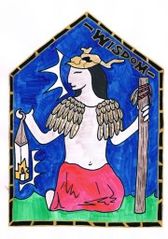Wisdom
The Path of Wisdom
There are many citizens of the Empire who believe themselves, by nature, to be filled with the virtue and it comes easily to them, yet the truth is – like all the virtues – Wisdom is a journey and must ever be striven for. Only the fool believes their journey is complete. Wisdom in the Empire takes many forms and what might benefit you in the Wintermark could as easily be your ruin in Varushka. Wisdom’s natural enemies are folly and complacency who steal the wit and desire for understanding and enlightenment. There is also dispute amongst the wise as to the extent that knowledge should be shared with the unready lest it imperils them.
Guidance on the Path
Through meditation on the auras of Wisdom, and careful analysis of the stories of paragons and exemplars, the priests of the Way have gleaned insight into the heart of the virtue and how best to pursue it. There are collections of parables, tales, sayings and teachings that distil this for Imperial citizens to learn from. The following are a handful of teachings and sayings deemed to be essential to understanding the path:
- The Virtuous apply what they have learned; Wisdom knows all knowledge is incomplete.
- Let every word you speak carry meaning; do not use forty when four will do.
- Wisdom is not always knowing the answer; Wisdom is finding the right question.
- Test what you learn; only fools accept hearsay as truth.
- Despise folly and chastise the fool that spreads it.
Paragons and Exemplars
Recognised paragons and exemplars of Wisdom include:
- The legendary paragon Zoria learned the names of all the creatures of the wild; bird and beast, fish and fowl and using their names, commanded them to serve her.
- The paragon Isenbrad of the Steinr was known for practicality, good judgement and wise counsel, and is said to have been the first runesmith
- The paragon Atun of the Highborn steered the ships that bore the Highborn through unknown waters to their new homeland.
- The exemplar Avigliana di Sarvos of League encouraged others to take note of the world they lived in and put the truth of it in writing.
- The exemplar Kala codified a system of weights and measures that are still in use today and provided much of the foundation for modern Imperial scholarship.
Symbols of Wisdom
One of the most widely accepted symbols of Wisdom is the scale, used to weigh and measure the world. Other tools of measurement, evaluating, and recording knowledge are also popular including the abacus, the quill, and the rolled scroll.
Things that create light and illumination are also popular icons of Wisdom, and there is some crossover with the symbols of vigilance in this regard but the meaning tends to be subtly different. The lantern, the candle, and the torch allow the virtuous to see clearly, and to understand things as they actually are, as well as to provide the opportunity to take action (such as when Isenbrad used a lantern to illuminate the cave in which he carved his runic secrets). Many priests and pilgrims of the Path of Wisdom often carry sources of light or the means to provide such, along with the means to record such knowledge and wisdom that they encounter.
Before the formation of the Synod, Wisdom was often represented by animals of one type or another, perhaps in recognition of the mastery of animals practiced by Zoria. The early Synod discouraged this practice; especially among the Highborn it was argued that beasts are inferior to humans - although understandably this attitude did not sit well with the people of Wintermark or Varushka who largely ignored it.
The raven symbolises wisdom in Wintermark, while in Varushka they prefer the squirrel and the vigilant spider. Unsurprisingly perhaps some magicians use the rune Irremais, which represents a certain kind of wisdom.
During their Spring festival, the Urizen represent Wisdom with white or silver flowers.
Wisdom is not short hand for ‘action I’d like you to take’, and foolishness is not synonymous with ‘outcome I wish you had not provoked'
Cardinal Agnetha De Rondell, Spring 378YEFurther reading
- You can learn about the various spiritual roleplaying effects created by priests dedicated to Wisdom here.
- You can learn about the skills that priests can use to enlighten others to the virtue of Wisdom here.
